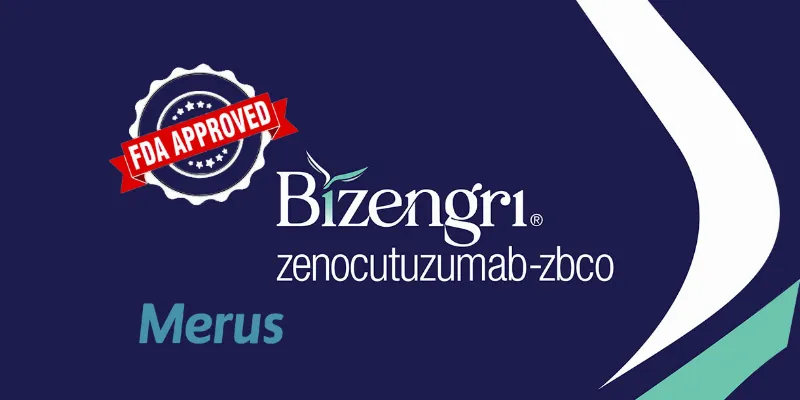FDA Grants Accelerated Approval to Bizengri for NRG1+ Pancreatic Cancer and NSCLC

The US Food and Drug Administration (FDA) has granted accelerated approval to Bizengri® (zenocutuzumab-zbco), a first-in-class bispecific antibody targeting NRG1+ pancreatic adenocarcinoma and NRG1+ non-small cell lung cancer (NSCLC). In the eNRGy trial, Bizengri achieved an overall response rate (ORR) of 40% in pancreatic adenocarcinoma and 33% in NSCLC, underscoring its efficacy in NRG1+ cancers.
Developed by Merus N.V., Bizengri is indicated for adults with advanced, unresectable, or metastatic NRG1+ pancreatic adenocarcinoma and NRG1+ NSCLC who have experienced disease progression following prior systemic therapies. The approval is based on efficacy data from the eNRGy trial, a multicenter, open-label study evaluating patients with these genetic alterations.
“The FDA approval of BIZENGRI® marks an important milestone for patients with pancreatic adenocarcinoma or NSCLC that is advanced unresectable or metastatic and harbors the NRG1 gene fusion. I have seen firsthand how treatment with BIZENGRI® can deliver clinically meaningful outcomes for patients,” said Dr. Alison Schram, medical oncologist and a principal investigator for the ongoing eNRGy trial.
Efficacy Results
- Pancreatic adenocarcinoma: Among 30 patients, Bizengri demonstrated an overall response rate (ORR) of 40% (95% CI: 23%, 59%), with a duration of response (DOR) ranging from 3.7 to 16.6 months.
- NSCLC: In a cohort of 64 patients, the ORR was 33% (95% CI: 22%, 46%), with a median DOR of 7.4 months (95% CI: 4.0, 16.6).
Responses were evaluated using the RECIST v1.1 criteria, with results independently reviewed by blinded central experts.
Safety Profile
The most common adverse reactions (≥10%) included:
- Gastrointestinal symptoms: Diarrhea, nausea, vomiting, and abdominal pain.
- Systemic effects: Fatigue, musculoskeletal pain, rash, and dyspnea.
- Infusion-related reactions (IRRs).
Grade 3 or 4 laboratory abnormalities observed in over 10% of patients included decreased hemoglobin, sodium, and platelets, along with elevated liver enzymes. The prescribing information also includes a Boxed Warning for embryo-fetal toxicity, necessitating pregnancy prevention during treatment.
Mechanism of Action
Bizengri is an innovative bispecific antibody targeting HER2 and HER3 receptors, effectively inhibiting HER2:HER3 dimerization and disrupting NRG1 binding to HER3. This mechanism halts downstream signaling pathways involved in cancer proliferation, while its antibody-dependent cytotoxicity further enhances antitumor activity. Preclinical models of NRG1+ lung and pancreatic cancers have demonstrated significant tumor regression with Bizengri.
“Bizengri is Merus’s first approved medicine based on our highly innovative and proprietary Biclonics® technology platform and offers significant promise for patients with NRG1+ pancreatic adenocarcinoma and NRG1+ NSCLC,” said Shannon Campbell, Chief Commercial Officer of Merus.
Next Steps and Patient Access
Bizengri is expected to become available within weeks. To ensure equitable access, Merus has launched PTx Assist™, a comprehensive support program providing resources for patients and caregivers, including financial assistance and insurance navigation.











Comments
No Comments Yet!